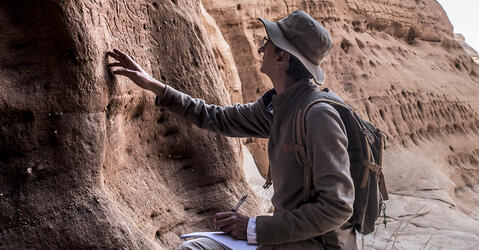You are here
Articles
0 comments
For the first time, researchers are assessing people’s opinions on policies for the global redistribution of wealth and the fight against climate change. Such measures receive massive, nearly universal support, albeit more so in Europe than in the United States.
Recent Articles
Article
10.03.2025
The concept of an “energy transition” is misleading, states the CNRS science historian Jean-Baptiste Fressoz. He explains why coal and oil never replaced wood, and that the fight against climate...
Article
09.29.2025
Oil isn't the only treasure hidden in the Arabian desert. French-Saudi archaeological teams are gradually unearthing a hitherto unsuspected heritage, including urban development, languages,...
Article
09.24.2025
Due to global warming and ever greater human activity, phytoplankton blooms are becoming increasingly frequent in lakes and oceans. Their impact on health, the economy and the environment is already...
Article
09.18.2025
Forty-four years after the earliest cases of AIDS were identified, the historian Marion Aballéa retraces the social, economic, cultural, scientific and public health history of the first pandemic...
Article
09.12.2025
With large-scale observation campaigns, innovative data analysis methods and theoretical advances on all fronts, astrophysics and cosmology are entering a high-precision era with the potential to...
Article
09.10.2025
By combining theoretical abstraction with practical impact, Stéphane Mallat has left a lasting mark on mathematics and computer science. From the JPEG 2000 image compression standard to the...
Article
05.28.2025
On 14 May, 2025, the Musée de la Musique in Paris unveiled a completely new presentation of the 9,000 items in its collections, highlighting the connections among the musical traditions of different...
Article
05.25.2025
In the contaminated area around Fukushima, Japan, scientists are studying the impact of radioactivity on the cognitive abilities of pollinating insects such as honeybees and giant hornets.
Article
05.21.2025
The first mapping of mitochondria in the brain has just been revealed. This is yet another step towards understanding these structures which supply their energy to brain cells and are involved in a...
Article
04.28.2025
Why does a rose smell like a rose? Scientists have analysed the chemical composition of floral odours, whose volatile compounds serve not only to attract but also to repel.
Article
04.22.2025
Navigation tools, sales optimisation software, higher education platforms…Algorithms are not immune to ethical bias. Well before the tsunami of generative artificial intelligence, specialists on...
04.21.2025
Prehistoric sites across France, such as the famous Chauvet Cave or L’Ile d’Yeu, are being closely monitored so as to understand how they are being endangered by climate change, and avoid the...


















